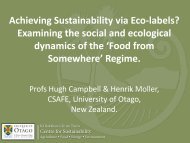Book of Abstract (incl. addendum) - IFSA symposium 2012
Book of Abstract (incl. addendum) - IFSA symposium 2012
Book of Abstract (incl. addendum) - IFSA symposium 2012
Create successful ePaper yourself
Turn your PDF publications into a flip-book with our unique Google optimized e-Paper software.
Workshop 2.3 Systems thinking and practice in rural innovation: advances in concept,<br />
methodologies and interventions<br />
Re-orienting rural innovation<br />
Paul Swagemakers, Ton Baars and Han Wiskerke<br />
University Vigo, Spain<br />
Paul.Swagemakers@uvigo.es<br />
The modernization <strong>of</strong> agriculture is resulting in an increasing disconnection between farming, nature<br />
and society, creating a series <strong>of</strong> social, economic and ecological crises in the food chain. Rural<br />
innovation starts where innovative practitioners successfully adapt their farm in a step-by step<br />
innovation process. From a radical prospect on the role and functioning <strong>of</strong> the farm it gradually unfolds<br />
as a productive farm that matches changing societal needs. This type <strong>of</strong> systemic configurations<br />
unfolds in different contexts but shares the common characteristic that the adaptations – conceptualized<br />
as novelties – are guided by a re-orientation towards the local (ecological and socio-economic)<br />
resource base. Promising farm practices can be further strengthened when scientists explore, test and<br />
verify the interrelations between novelties whilst politicians and policy makers pursue an objectives-led<br />
policy (instead <strong>of</strong> implementing prescriptive measures) that allows for and stimulates the exchange <strong>of</strong><br />
novelties between producers and promotes scientific research on promising novelties.<br />
Toward a reflexive framework to compare collective design methods for<br />
farming system innovation<br />
Elsa Berthet, Julie Labatut and Nathalie Girard<br />
Mines ParisTech, France<br />
Elsa.Berthet@agroparistech.fr<br />
Faced with strong environmental issues, the agricultural sector has to revise deeply its aims and<br />
performance criteria. Theories and methods are urgently needed to foster the design <strong>of</strong> innovative<br />
farming systems reconciling production with other ecosystem services, while taking into account<br />
heterogeneous stakeholder viewpoints in situations <strong>of</strong> high uncertainty (Voβ et al, 2006; Leeuwis,<br />
2004).<br />
Numerous methods have been proposed over the past decades to facilitate collective learning for<br />
environmental management (Reed, 2008). Most <strong>of</strong> them promote problem-solving or scenario-based<br />
approaches to tackle issues such as common goods management, with in particular methods grounded<br />
on Role-Playing Games (Hartig et al., 2010; Vieira Pak & Castillo Brieva, 2010). By integrating<br />
existing knowledge and stakeholders’ perspectives, such simulation approaches have proved to be<br />
efficient in crossing disciplinary boundaries and understanding systems’ complexity. However<br />
scenarios and models are <strong>of</strong>ten based on consensus or established knowledge. Considering that the<br />
design <strong>of</strong> innovative farming systems requires interplay between exploitation <strong>of</strong> existing knowledge<br />
and exploration <strong>of</strong> innovative futures (March, 1991), we question the relevance <strong>of</strong> simulation<br />
approaches to go beyond incremental innovation.<br />
In this paper, we compare participative methods such as the Forage Rummy (Martin et al, 2011)<br />
and the Companion Modelling approach (Etienne, 2011) with a method based on C-K theory (Hatchuel<br />
& Weil, 2009), developed in the industrial sector to manage collective exploration for radical<br />
innovation. As organisers and observers <strong>of</strong> design workshops using these methods, we analyse for each<br />
<strong>of</strong> them how existing and induced knowledge is managed and gaps are identified, how conceptual<br />
exploration is conducted, and how relations between participants are taken into account. Finally, we<br />
discuss how these methods could be combined to foster radical innovation in the field <strong>of</strong> farming<br />
system design.<br />
44











